1974–75 South Pacific cyclone season
The 1974–75 South Pacific cyclone season ran year-round from July 1 to June 30. Tropical cyclone activity in the Southern Hemisphere reaches its peak from mid-February to early March.
| 1974–75 South Pacific cyclone season | |
|---|---|
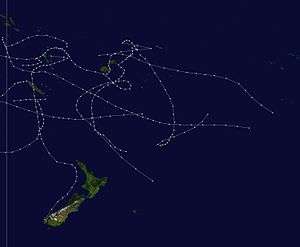 Season summary map | |
| Seasonal boundaries | |
| First system formed | November 20, 1974 |
| Last system dissipated | April 6, 1975 |
| Strongest storm | |
| Name | Val and Alison |
| • Maximum winds | 155 km/h (100 mph) (10-minute sustained) |
| • Lowest pressure | 945 hPa (mbar) |
| Seasonal statistics | |
| Total disturbances | 6 |
| Tropical cyclones | 5 |
| Severe tropical cyclones | 3 |
| Total fatalities | Unknown |
| Total damage | Unknown |
| Related articles | |
Systems
Cyclone 04P
| Tropical storm (SSHWS) | |
  | |
| Duration | December 6 – December 9 |
|---|---|
| Peak intensity | 65 km/h (40 mph) (1-min) |
This cyclone existed from December 6 to December 9.
Cyclone 05P
| Tropical storm (SSHWS) | |
  | |
| Duration | December 11 – December 15 |
|---|---|
| Peak intensity | 85 km/h (50 mph) (1-min) |
This cyclone existed from December 11 to December 15.
Cyclone 06P
| Tropical storm (SSHWS) | |
  | |
| Duration | December 18 – December 24 |
|---|---|
| Peak intensity | 95 km/h (60 mph) (1-min) |
This cyclone existed from December 18 to December 24.
Tropical Cyclone Flora
| Category 2 tropical cyclone (Australian scale) | |
| Tropical storm (SSHWS) | |
  | |
| Duration | January 12 – January 22 |
|---|---|
| Peak intensity | 100 km/h (65 mph) (10-min) 980 hPa (mbar) |
Tropical Cyclone Flora existed from January 12 to January 22.
Tropical Cyclone Gloria
| Category 2 tropical cyclone (Australian scale) | |
| Tropical storm (SSHWS) | |
  | |
| Duration | January 19 – January 23 |
|---|---|
| Peak intensity | 100 km/h (65 mph) (10-min) 976 hPa (mbar) |
Tropical Cyclone Gloria existed from January 14 to January 23.
Cyclone 15P
| Tropical storm (SSHWS) | |
  | |
| Duration | January 19 – January 21 |
|---|---|
| Peak intensity | 65 km/h (40 mph) (1-min) |
This cyclone existed from January 19 to January 21.
Severe Tropical Cyclone Val
| Category 3 severe tropical cyclone (Australian scale) | |
| Category 4 tropical cyclone (SSHWS) | |
 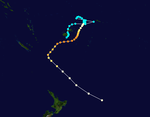 | |
| Duration | January 24 – February 5 |
|---|---|
| Peak intensity | 155 km/h (100 mph) (10-min) 945 hPa (mbar) |
This cyclone existed from January 24 to February 5.
Cyclone 18P
| Tropical storm (SSHWS) | |
  | |
| Duration | January 26 – January 28 |
|---|---|
| Peak intensity | 65 km/h (40 mph) (1-min) |
This cyclone existed from January 26 to January 28.
Severe Tropical Cyclone Alison
| Category 3 severe tropical cyclone (Australian scale) | |
| Category 4 tropical cyclone (SSHWS) | |
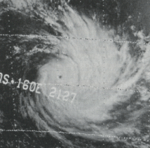 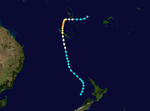 | |
| Duration | March 4 – March 13 |
|---|---|
| Peak intensity | 155 km/h (100 mph) (10-min) 945 hPa (mbar) |
This cyclone existed from March 4 to March 13.
Severe Tropical Cyclone Betty
| Category 3 severe tropical cyclone (Australian scale) | |
| Category 2 tropical cyclone (SSHWS) | |
 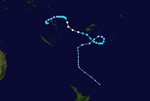 | |
| Duration | March 30 – April 12 |
|---|---|
| Peak intensity | 130 km/h (80 mph) (10-min) 965 hPa (mbar) |
This cyclone existed from March 30 to April 12.
Other systems
The first tropical disturbance of the season was first noted on November 19, while it was located within the Australian region about 500 km (310 mi) to the north of Brisbane, Australia.[1][2] Over the next couple of days, the system moved north-westwards into the South Pacific basin towards New Caledonia, before it recurved south-eastwards and was last noted as it moved back into the Australian region during November 24.[1][3] A windspeed of 75 km/h (45 mph) was recorded in northern New Zealand and associated with this system.[1]
Seasonal effects
| Name | Dates active | Peak classification | Sustained wind speeds |
Pressure | Areas affected | Damage (USD) |
Deaths | Refs |
|---|---|---|---|---|---|---|---|---|
| Unnamed | November 20 - 24, 1974 | Moderate tropical depression | 85 km/h (50 mph) | 994 hPa (29.35 inHg) | New Caledonia | [1] | ||
| Betty | March 30 – April 12, 1975 | Category 3 severe tropical cyclone | 130 km/h (80 mph) | 965 hPa (28.50 inHg) | Vanuatu, Fiji, New Zealand | [4] | ||
| Season aggregates | ||||||||
| 8 systems | November 19 – May 12 | |||||||
See also
References
- "Saison des perturbations tropicales: 1974-1975 dans le pacifique sud-oues". Météorologie Maritime (in French). No. 137. 1976. pp. 43–46. ISSN 2107-0830.
- "1974 Not Named (1974324S24156)". International Best Track Archive for Climate Stewardship. Retrieved November 5, 2019.
- "1974 Tropical Cyclone (Gale) Not Named (1974325S24166)". International Best Track Archive for Climate Stewardship. Retrieved November 5, 2019.
- MetService (May 22, 2009). "TCWC Wellington Best Track Data 1967–2006". International Best Track Archive for Climate Stewardship.